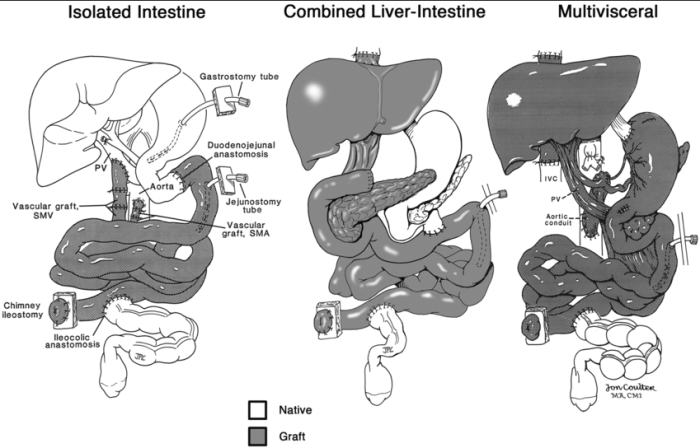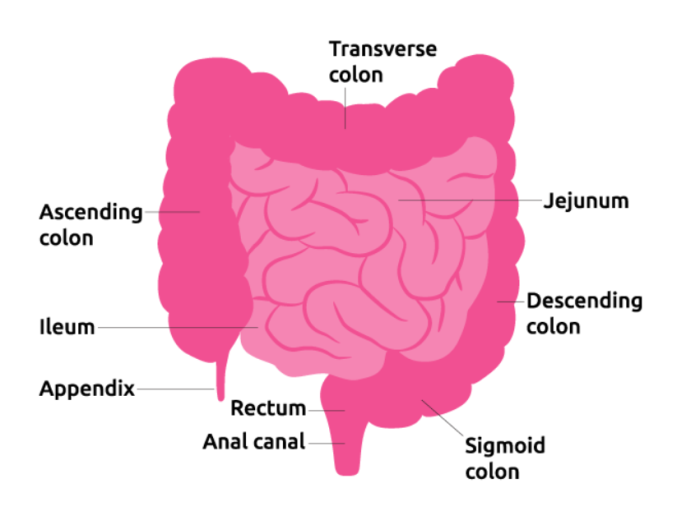Intestine Transplant in India
Intestine transplant in India is emerging as a vital treatment option for patients with severe intestinal failure. Renowned hospitals in India offer advanced medical technology and expert surgical teams, making it a top destination for this complex procedure. With increasing success rates and affordable costs, India is becoming a preferred choice for intestine transplants.
Medical disclaimer: This content is for general awareness and does not replace a doctor’s consultation. For diagnosis or treatment decisions, consult a qualified specialist.
Understanding Intestine Transplant
What is an Intestine Transplant and How Does it Work?
An intestine transplant is a surgical procedure to replace a diseased or damaged intestine with a healthy one from a donor. This complex surgery is crucial for patients with irreversible intestinal failure, helping restore normal digestive function and improve quality of life.
When is an Intestine Transplant Necessary?
An intestine transplant is necessary when patients suffer from severe intestinal failure that cannot be managed with medical therapy or parenteral nutrition. It is typically recommended for conditions like short bowel syndrome, Crohn's disease, or severe intestinal obstruction.
Different Types of Intestine Transplants
Different types of intestine transplants include isolated intestine transplant, combined liver-intestine transplant, and multivisceral transplant. An isolated intestine transplant replaces only the small intestine, while a combined liver-intestine transplant addresses both liver and intestinal failure. A multivesicular transplant involves replacing the stomach, pancreas, liver, and intestine.

The Intestine Transplant Procedure
Pre-Transplant Evaluation Process
The pre-transplant evaluation process for an intestine transplant involves a thorough assessment of the patient's overall health, including blood tests, imaging studies, and psychological evaluations. This comprehensive evaluation ensures the patient is a suitable candidate for the procedure and can handle the post-transplant care requirements.

Finding a Suitable Donor Intestine
Finding a suitable donor intestine involves matching the donor's tissue type and blood type with the recipient's to reduce the risk of rejection. The process requires a thorough medical evaluation and is coordinated through transplant registries to ensure compatibility and the best possible outcomes.
Detailed Surgical Procedure for Intestine Transplant
The detailed surgical procedure for an intestine transplant involves removing the diseased intestine and replacing it with a healthy donor intestine, carefully connecting blood vessels and the digestive tract. This complex surgery requires precision and expertise to ensure proper function and minimize complications.
Post-Transplant Care and Recovery
Post-transplant care and recovery for an intestine transplant include close monitoring, immunosuppressive medication to prevent rejection, and regular follow-up visits. Patients must adhere to a strict medical regimen and dietary guidelines to ensure successful recovery and long-term health.
Best Intestine Transplant Surgeons in India
India is home to some of the world's leading intestine transplant surgeons, renowned for their expertise and successful outcomes. Dr. Subash Gupta, a pioneer in organ transplantation, and Dr. Arvinder Singh Soin, a highly acclaimed liver and intestinal transplant specialist, are among the top names in this field. Their advanced techniques and compassionate care make India a preferred destination for intestine transplants.
Top Hospitals for Intestine Transplant in India
Leading intestine transplant hospitals in India include the All India Institute of Medical Sciences (AIIMS) in New Delhi, Fortis Memorial Research Institute in Gurgaon, and Apollo Hospitals in Chennai. These renowned centers are known for their advanced surgical techniques and high success rates in intestine transplantation.
Cost of Intestine Transplant Surgery in India
The cost of intestine transplant surgery in India typically ranges from ₹20 lakhs to ₹35 lakhs, depending on the hospital and specific medical needs. This cost generally includes the surgery, hospital stay, and post-operative care.
Explore a detailed breakdown of intestine transplant cost in India by visiting our in-depth guide intestine transplant cost in India.
Success Rates and Survival Statistics
Success rates for intestine transplants generally exceed 70-80%, with many patients experiencing significant improvements in quality of life. Survival statistics vary by center but show promising long-term outcomes with proper post-operative care and medication adherence.
Legal and Ethical Considerations in India
Legal and ethical considerations for intestine transplants in India involve strict adherence to the Transplantation of Human Organs Act, ensuring informed consent and ethical organ procurement. Hospitals must comply with regulations to ensure transparency and prevent unethical practices in organ donation.
Preparing for an Intestine Transplant
Necessary Lifestyle Changes Before Intestine Transplant
Before an intestine transplant, necessary lifestyle changes include adopting a nutritious diet, quitting smoking, and managing existing health conditions. These adjustments help improve overall health and increase the likelihood of a successful transplant outcome.
Medications and Treatments Required for Intestine Transplant Patients
Intestine transplant patients require lifelong immunosuppressive medications to prevent organ rejection, along with regular follow-up treatments to monitor health and manage potential complications. Adhering to prescribed medication and treatment regimens is crucial for long-term success and overall well-being.
Importance of Support Systems and Counseling
Support systems and counseling are crucial for intestine transplant patients, as they provide emotional support, guidance through the recovery process, and help in managing stress. These resources play a key role in improving mental well-being and overall transplant outcomes.
Life After Intestine Transplant Surgery
Recovery Process After Intestine Transplant
The recovery process after an intestine transplant involves a period of hospital stay for monitoring, gradual reintroduction of diet, and adherence to a strict medication regimen. Patients must follow medical advice closely and attend regular follow-ups to ensure optimal healing and long-term success.
Long-term Care and Monitoring
Long-term care and monitoring after an intestine transplant include regular check-ups, continuous immunosuppressive therapy, and routine blood tests to track organ function and prevent rejection. Adhering to follow-up schedules and medical advice is essential for maintaining transplant success and overall health.
Potential Risks and Complications
Potential risks and complications of an intestine transplant include organ rejection, infection, and issues related to immunosuppressive medications such as increased risk of cancer. Close monitoring and adherence to medical guidelines are crucial to managing these risks effectively.
Success Stories of Intestine Transplant Patients
Success stories of intestine transplant patients highlight significant improvements in quality of life and long-term health. Many patients experience restored digestive function and return to normal activities, showcasing the transformative impact of successful transplantation and dedicated post-operative care.
Success Stories of Intestine Transplant Patients
Johnathan Nauta Inspiring intestine Transplant Journey
Johnathan Nauta, 37, had suffered with intestinal obstructions for most of his life. After more than 20 surgeries failed
to fix the problem, he had run out of options. Today, thanks to an abdominal wall and intestine transplant, Nauta is getting
back to normal life at home with his wife and kids.
Katie Silva-Mendez Inspiring intestine Transplant Journey
Katie Silva-Mendez was diagnosed with an aggressive type of Crohn's disease. After 29 surgeries, she was referred to
hospice. Unwilling to give up, she traveled from her home state of Nevada to be cared for by the experts at MedStar
Georgetown Transplant Institute which has the largest intestinal transplant program in the United States. She received a
small and large bowel transplant and says she feels like a new person, living and eating pain-free.

Frequently Asked Questions (FAQs) about Intestine Transplant
What is the success rate of intestine transplants in India?
The success rate of intestine transplants in India is around 70-75% for the first year, indicating positive outcomes for many patients undergoing this complex procedure.
How long is the waiting period for an intestine transplant in India?
The waiting period for an intestine transplant in India varies, often ranging from several months to a year, depending on the availability of suitable donors and the patient's condition.
What is the cost of an intestine transplant in India?
The cost of an intestine transplant in India typically ranges from ₹25 lakh to ₹40 lakh, covering the surgery, hospital stay, and necessary post-operative care.
What are the eligibility criteria for an intestine transplant?
Eligibility criteria for an intestine transplant include severe intestinal failure that cannot be managed by other treatments and the absence of medical conditions that would complicate the surgery.
What is the recovery time after an intestine transplant?
The recovery time after an intestine transplant is typically between 3 to 6 months, during which patients undergo close monitoring and adhere to a strict post-operative care regimen.
What are the risks and complications associated with intestine transplants?
Risks and complications of intestine transplants include organ rejection, infections, and side effects from immunosuppressive medications, requiring careful management by medical professionals.
How do I find a suitable donor for an intestine transplant in India?
Finding a suitable donor for an intestine transplant in India involves working with hospitals and organ donation registries to match donors based on tissue compatibility and other factors.
What kind of post-transplant care is required?
Post-transplant care for intestine transplant patients includes lifelong immunosuppressive medication, regular check-ups, and lifestyle changes to ensure the transplanted organ functions properly.
Are intestine transplants covered by insurance in India?
Some insurance plans in India cover intestine transplants, but it is essential to check with your insurance provider to understand the specifics of coverage and any potential out-of-pocket expenses.
Where can I find support groups for intestine transplant patients in India?
Support groups for intestine transplant patients in India can be found through hospitals and online communities, providing emotional support and shared experiences to help patients and their families navigate the transplant journey.
Resources and Support for Intestine Transplant Patients
Intestine Transplant Support Groups and Communities in India
Intestine transplant support groups and communities in India provide crucial emotional support, resources, and shared experiences for patients and their families. These groups, often facilitated by hospitals and non-profit organizations, help patients navigate their journey and improve their quality of life post-transplant.
Further Reading and Information on Intestine Transplants
For further reading and information on intestine transplants, refer to medical journals like the "American Journal of Transplantation," hospital websites such as AIIMS and Apollo Hospitals, and transplant organizations like the Indian Society of Transplantation. These sources offer comprehensive insights and the latest research in the field.
Small bowel transplants and multivisceral transplants are vital surgical procedures for treating severe gastrointestinal conditions. Small bowel transplants involve replacing a diseased segment of the small intestine with a healthy donor section, typically for patients with irreversible intestinal failure like short bowel syndrome. Multivisceral transplants, however, are more complex and involve replacing multiple organs within the gastrointestinal tract, such as the small intestine, liver, pancreas, stomach, and sometimes kidneys, for patients with multiple organ failure or severe congenital bowel issues. Comparing Small Bowel Transplants and Multivisceral Transplants
Updated for 2025 – Discover the best hospitals in India for intestine transplant procedures, including top choices, advanced techniques, and cost-effective options. Intestine Transplant Cost in India
Explore the latest alternatives to intestine transplantation, including innovative therapies, emerging treatments, and patient success stories. Discover how advancements in medical science are providing new hope for managing intestinal disorders without the need for transplantation. Intestine Transplant Alternatives: Emerging Therapies and Innovations